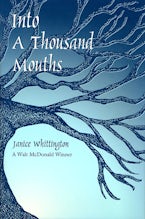In the bone-dry land of mesquites and drought, Janice Whittington has found images that allow her to explore woman’s place in West Texas and the world from the perspectives of daughter, wife, friend, and mother. Filled with fear and fire, joy and sorrow, dust and water; the poems risk stepping into air, striving to glide like hawks on thermals.
“Into a Thousand Mouths is the account of Eve after the fall, after she follows her husband out of the garden and of tilling yield.... It is the account of one woman, of all women—’that female secret of wombs, / the ache that folds into the chest / and stays, a wound / nursed into a jewel (‘Daughters’). . . .
“The connections between women and a needy world seem to be infinite, as the five sections of the book suggest, orchestrating and developing the connections of women to their fathers, their mothers, their grandparents and great-grandparents, to their heritage of pioneer women, to their displacement from the fecund East and their alienation in the seemingly barren West, to their daughters, and to their husbands.”
“...[Whittington’s] Eve has planted her jungle west, not east of Eden, and like the trumpet vine that ‘shares orange buds’ (‘Rain Forests’) and the desert plants that put down roots (‘The Roots of Desert Plants’), her jungle just might flourish.”
—Robert Fink, from the Foreword
Woman of the Sea
Did she caulk the cabin cracks
with bread dough, the dirt too hard to chip
into mud? Did wedding quilts
drag the floor, capes for one
who had packed away her veils?
Did her hands bleed
from lye scrubbed into shirts,
from breaking manure and cactus
into chunks for fire?
Did she turn her back to the wind
or lift her chin and dream of oceans,
wearing her hair loose,
bits of coral catching wisps in a red comb,
inviting men full of salt
to sail through dangers to her arms?
Did she one day
slip pins from her hair
and step into waves of the prairie,
searching for shore
and singing?

